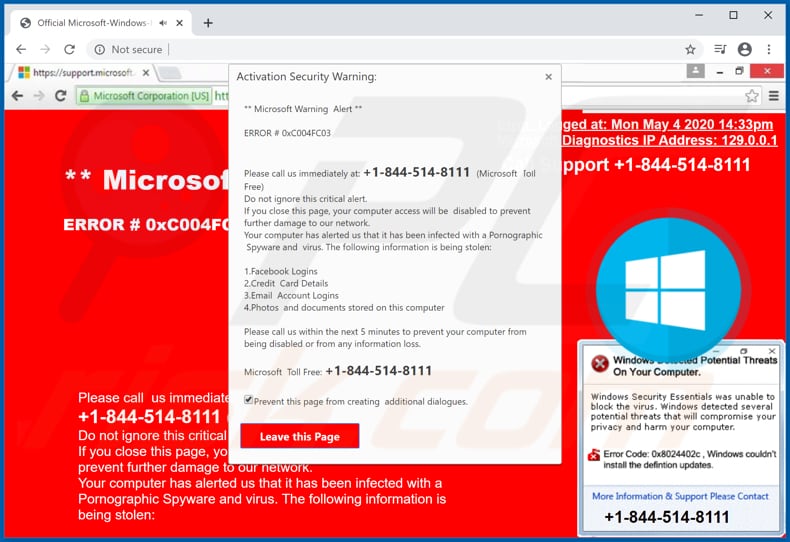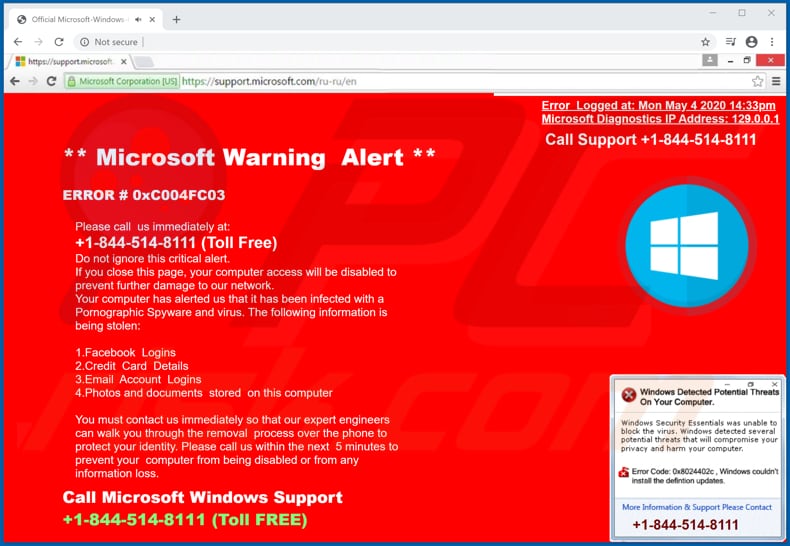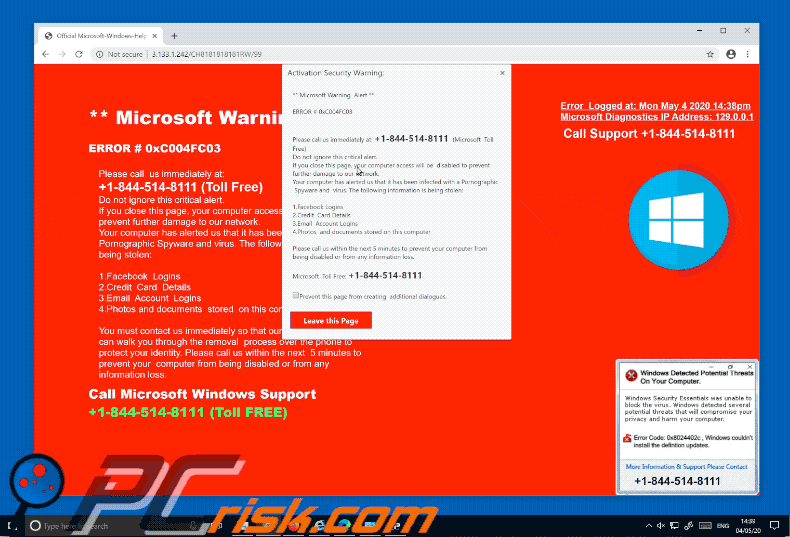Do not trust the Activation Security Warning scam
Phishing/ScamAlso Known As: Activation Security Warning tech support scam
Get free scan and check if your device is infected.
Remove it nowTo use full-featured product, you have to purchase a license for Combo Cleaner. Seven days free trial available. Combo Cleaner is owned and operated by RCS LT, the parent company of PCRisk.com.
What is "Activation Security Warning"?
Like most tech support scams, this one attempts to trick people into believing that their computers are infected with viruses and calling the provided number. Typically, criminals behind these scams try to deceive unsuspecting users into paying for 'tech support services' they do not need and/or granting remote access to their computers.
In any case, you should ignore these scams and never contact the scammers behind them. Note that people do not often visit these scam pages intentionally - in most cases, they are opened through other sites of this kind, dubious ads, or potentially unwanted apps (PUAs) installed on the system/browser.

This scam website is disguised as an official Microsoft Support web page claiming that it has detected an error named "# 0xC004FC03", "Pornographic Spyware", and a virus. It also notifies visitors that their Facebook and email account logins, credit card details, photos and documents are being stolen.
To prevent the computer from being disabled and suffering possible further damage (such as data loss), visitors must supposedly call the "+1-844-514-8111" number within five minutes. Note that this scam page is accompanied by a loud audio message stating that the computer is infected and encouraging visitors to take immediate action.
When scammers are contacted by phone, they ask users to grant remote access to their computers and then claim to run a diagnostic test, virus scan, etc. Essentially, they seek to deceive people into paying to fix a problem that does not exist (e.g., removal of a virus or an error).
The scammers might use the remote access to download and install malicious software such as Trojans, ransomware or other high-risk malware.
This enables them to generate revenue in various ways. Commonly, scammers behind these scams claim to be technicians from a well-known company such as Microsoft. Neither Microsoft nor other legitimate companies have anything to do with these scams.
| Name | Activation Security Warning tech support scam |
| Threat Type | Phishing, Scam, Social Engineering, Fraud. |
| Fake Claim | This tech support scam claims that the user's computer is infected with viruses. |
| Tech Support Scammer Phone Number | +1-844-514-8111 |
| Related IP Address | 3.133.1.242 |
| Symptoms | Fake error messages, fake system warnings, pop-up errors, hoax computer scan. |
| Distribution methods | Compromised websites, rogue online pop-up ads, potentially unwanted applications. |
| Damage | Loss of sensitive private information, monetary loss, identity theft, possible malware infections. |
| Malware Removal (Windows) |
To eliminate possible malware infections, scan your computer with legitimate antivirus software. Our security researchers recommend using Combo Cleaner. Download Combo CleanerTo use full-featured product, you have to purchase a license for Combo Cleaner. 7 days free trial available. Combo Cleaner is owned and operated by RCS LT, the parent company of PCRisk.com. |
More examples of similar scams include "ZoneAlarm Global Virus Alert", "Your Windows 10 Is Infected With 5 Viruses!" and "WARNING! 36 infections found!!!". Browsers open these pages due to potentially unwanted apps that are installed on the browsers and/or operating systems.
Note that apps of this type often serve ads and gather information. PUAs can serve coupons, pop-up ads, surveys, banners and other intrusive advertisements. When clicked, these can open dubious web pages. In some cases, they can be designed to run scripts to download and install unwanted software.
Most PUAs collect browsing data such as geolocations, entered search queries, addresses of visited websites, IP addresses, etc. In some cases, they record personal, sensitive data. The information is sold to third parties (even cyber criminals) who misuse it in various ways. Remove all PUAs from browsers and computers immediately.
How did potentially unwanted applications install on my computer?
PUAs are commonly included into the download/installation set-ups of other software. This distribution method is known as "bundling". Developers use it to trick people into downloading and installing PUAs together with other, regular software. Generally, information about additionally-included apps can be found in "Custom"," Advanced" or other setup settings.
Many users fail to check and change these settings when they download and install their software. Leaving them unchanged allows PUAs to be downloaded and installed. Clicking deceptive ads can cause them to execute scripts designed to download and install potentially unwanted applications.
How to avoid installation of potentially unwanted applications
All software should be downloaded from official pages and through direct links. Peer-to-Peer networks (e.g., torrent clients, eMule), unofficial websites, third party downloaders, installers, and other channels, tools of this kind should not be used to download or install any programs or files - they are often used to distribute unwanted, malicious programs.
Check "Advanced", "Custom" and other settings of the download/installation setup and decline offers to download or install additionally-included, potentially unwanted apps. Do not click intrusive ads that appear on dubious web pages, since they tend to open untrusted websites and can download and install unwanted software.
Remove all unwanted, suspicious extensions, plug-ins and add-ons installed on the browser, and software of this kind installed on the operating system. If your computer is already infected with PUAs, we recommend running a scan with Combo Cleaner Antivirus for Windows to automatically eliminate them.
Text presented in "Activation Security Warning" pop-up and background page:
Activation Security Warning:
** Microsoft Warning Alert **
ERROR # 0xC004FC03
Please call us immediately at + 1-844-514-8111 (Microsoft Toll Free)
Do not ignore this critical alert.
If you close this page, your computer access will be disabled to prevent further damage to our network.
Your computer has alerted us that it has been infected with a Pornographic Spyware and virus. The following information is being stolen:
1.Facebook Logins
2. Credit Card Details
3. Email Account Logins
4.Photos and documents stored on this computer
Please call us within the next 5 minutes to prevent your computer from being disabled or from any information loss.
Microsoft Toll Free: +1-844-514-8111
Prevent this page from creating additional dialogues.
Leave this Page
Screenshot of the background page:

The appearance of "Activation Security Warning" pop-up scam (GIF):

Instant automatic malware removal:
Manual threat removal might be a lengthy and complicated process that requires advanced IT skills. Combo Cleaner is a professional automatic malware removal tool that is recommended to get rid of malware. Download it by clicking the button below:
DOWNLOAD Combo CleanerBy downloading any software listed on this website you agree to our Privacy Policy and Terms of Use. To use full-featured product, you have to purchase a license for Combo Cleaner. 7 days free trial available. Combo Cleaner is owned and operated by RCS LT, the parent company of PCRisk.com.
Quick menu:
- What is Activation Security Warning tech support scam?
- How to identify a pop-up scam?
- How do pop-up scams work?
- How to remove fake pop-ups?
- How to prevent fake pop-ups?
- What to do if you fell for a pop-up scam?
How to identify a pop-up scam?
Pop-up windows with various fake messages are a common type of lures cybercriminals use. They collect sensitive personal data, trick Internet users into calling fake tech support numbers, subscribe to useless online services, invest in shady cryptocurrency schemes, etc.
While in the majority of cases these pop-ups don't infect users' devices with malware, they can cause direct monetary loss or could result in identity theft.
Cybercriminals strive to create their rogue pop-up windows to look trustworthy, however, scams typically have the following characteristics:
- Spelling mistakes and non-professional images - Closely inspect the information displayed in a pop-up. Spelling mistakes and unprofessional images could be a sign of a scam.
- Sense of urgency - Countdown timer with a couple of minutes on it, asking you to enter your personal information or subscribe to some online service.
- Statements that you won something - If you haven't participated in a lottery, online competition, etc., and you see a pop-up window stating that you won.
- Computer or mobile device scan - A pop-up window that scans your device and informs of detected issues - is undoubtedly a scam; webpages cannot perform such actions.
- Exclusivity - Pop-up windows stating that only you are given secret access to a financial scheme that can quickly make you rich.
Example of a pop-up scam:

How do pop-up scams work?
Cybercriminals and deceptive marketers usually use various advertising networks, search engine poisoning techniques, and shady websites to generate traffic to their pop-ups. Users land on their online lures after clicking on fake download buttons, using a torrent website, or simply clicking on an Internet search engine result.
Based on users' location and device information, they are presented with a scam pop-up. Lures presented in such pop-ups range from get-rich-quick schemes to fake virus scans.
How to remove fake pop-ups?
In most cases, pop-up scams do not infect users' devices with malware. If you encountered a scam pop-up, simply closing it should be enough. In some cases scam, pop-ups may be hard to close; in such cases - close your Internet browser and restart it.
In extremely rare cases, you might need to reset your Internet browser. For this, use our instructions explaining how to reset Internet browser settings.
How to prevent fake pop-ups?
To prevent seeing pop-up scams, you should visit only reputable websites. Torrent, Crack, free online movie streaming, YouTube video download, and other websites of similar reputation commonly redirect Internet users to pop-up scams.
To minimize the risk of encountering pop-up scams, you should keep your Internet browsers up-to-date and use reputable anti-malware application. For this purpose, we recommend Combo Cleaner Antivirus for Windows.
What to do if you fell for a pop-up scam?
This depends on the type of scam that you fell for. Most commonly, pop-up scams try to trick users into sending money, giving away personal information, or giving access to one's device.
- If you sent money to scammers: You should contact your financial institution and explain that you were scammed. If informed promptly, there's a chance to get your money back.
- If you gave away your personal information: You should change your passwords and enable two-factor authentication in all online services that you use. Visit Federal Trade Commission to report identity theft and get personalized recovery steps.
- If you let scammers connect to your device: You should scan your computer with reputable anti-malware (we recommend Combo Cleaner Antivirus for Windows) - cyber criminals could have planted trojans, keyloggers, and other malware, don't use your computer until removing possible threats.
- Help other Internet users: report Internet scams to Federal Trade Commission.
Share:

Tomas Meskauskas
Expert security researcher, professional malware analyst
I am passionate about computer security and technology. I have an experience of over 10 years working in various companies related to computer technical issue solving and Internet security. I have been working as an author and editor for pcrisk.com since 2010. Follow me on Twitter and LinkedIn to stay informed about the latest online security threats.
PCrisk security portal is brought by a company RCS LT.
Joined forces of security researchers help educate computer users about the latest online security threats. More information about the company RCS LT.
Our malware removal guides are free. However, if you want to support us you can send us a donation.
DonatePCrisk security portal is brought by a company RCS LT.
Joined forces of security researchers help educate computer users about the latest online security threats. More information about the company RCS LT.
Our malware removal guides are free. However, if you want to support us you can send us a donation.
Donate
▼ Show Discussion